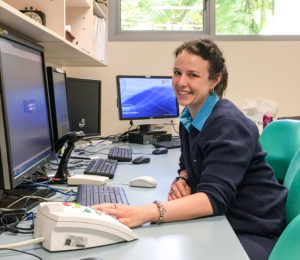‘I love making a difference every day’ – exploring the role of a Radiation Therapist

I was recently asked what I do for work. When I responded with “I’m a radiation therapist,” I got a response I was all too familiar with: “So you take and read x-rays?” Even my GP thought that’s what I did!
We do use x-rays, but what we actually do is use high energy x-rays to treat cancer patients, to which they then responded with; “Gee, that must be hard”. I won’t lie – some days are hard. We see some patients at an awful time in their life and detaching yourself from them emotionally, especially when their story is close to home, can be quite challenging at times. On the upside, we can be a huge help to some of these patients when we can be happy and bubbly and talk to them about things other than the dreaded ‘C’ word that everyone else in their circle wants to talk about.
We see some of our patients daily (Monday-Friday) for up to nine weeks; we get to know them, get to know their story and help them through their cancer journey. The rapport we build with our patients is just one of the reasons that I love my job.
I didn’t know what I wanted to do at the end of high school. I knew that I needed a job in which I could help people, in which there would always be a challenge, something with a bit of Maths and Science and where there were opportunities to grow and learn. I attended an open day at the local university and attended a talk on medical radiation science – it ticked all the boxes so off I went.
I completed my Bachelor of Medical Radiation Science (Radiation Therapy) at the University of Newcastle. It was a three-year degree with a professional development year to complete the qualification. There was a lot to learn: Physics, Anatomy, Psychology, Statistics, Research and a huge focus on communication and patient care. A large component of our learning was accumulated on clinical placement. The learning curve was pretty steep and one of the first patients I met really made me question my decision – ‘Is this for me?’ ‘Are all of our patients going to be like this?’ Luckily the next patient that I met put these feelings at ease! We do have some patients that are unwell and in a lot of pain, which can be difficult to deal with, but I focus on the fact that we are helping them, choosing to find a positive in a challenging situation. Overall, you wouldn’t know there was anything going on with the majority our patients. Getting to know them, their stories, hearing about their challenges and being able to have a chat, share a joke and cheer them up is one of the more rewarding aspects of our profession.
Radiation therapy is an exciting field to be in. There is a lot of quality research as everyone wants to improve patient treatment, care and outcomes. New technology is developed to assist us to accurately target the patient’s disease and treat them whilst minimising side effects. Every patient is different and the variety in our role allows for us to use different skills and work with other health professionals to treat the patient as a whole, not just the disease. It can also be entertaining! Some of the myths and questions that we get from patients and their family members are quite amusing: “Will I glow in the dark?” “Will I get super powers like the Hulk?” “Will I be radioactive?”
National Radiographers and Radiation Therapists Week (NRRTW) is a wonderful opportunity to recognise the great working relationships we have with our colleagues and other professionals involved in the care of our patients to ensure that we provide them with the best treatment available and to raise the profile of what we do. Radiation Therapy is underutilised (In Australia and New Zealand 20 per cent of patients that might benefit from RT do not receive it) so it is important to educate other health professionals and make information available to patients, to ensure that those patients who would benefit from radiotherapy actually have to option to receive it. Radiation therapy is a safe, effective and cost effective treatment for the cure and palliation of patients with cancer.
If I had to choose the best thing about being a radiation therapist, it is when the patients come in for their follow up and take great delight in telling you how well they are going and how much they appreciate the care they received from you. It’s even better when it’s a longer term follow up, the ones a year or more after treatment, and they can also tell you about how much the kids have grown, the arrival of new grandkids or where they are going on their next great adventure. The smiling faces and the journey really make this a satisfying career, I get to help people and make a difference each and every day that I go to work.
For more information on NRRTW, click here .
About the Author: Jenna Dean is a Radiation Therapist in Port Macquarie and a passionate advocate for rural patients receiving access to radiation therapy. Her interests include research, imaging, new technology, Cross Fit and photography.




